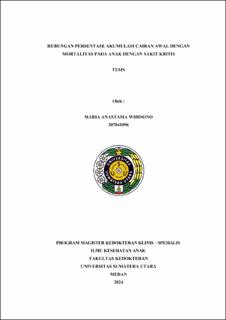Hubungan Persentase Akumulasi Cairan Awal dengan Mortalitas pada Anak dengan Sakit Kritis
Association between Early Fluid Accumulation and Mortality in Critically Ill Children

Date
2024Author
Wibisono, Maria Anastasia
Advisor(s)
Saragih, Rina Amalia Caromina
Pasaribu, Ayodhia Pitaloka
Metadata
Show full item recordAbstract
Objectives
Fluid therapy is essential during the resuscitation of critically ill children. However, aggressive resuscitation and additional fluids from medications and nutritional support often lead to fluid accumulation. Emerging evidence indicates that fluid buildup may negatively affect outcomes. This study aims to evaluate the relationship between early fluid accumulation and mortality in critically ill children.
Methods
This study enrolled 74 children in the PICU at Adam Malik, excluding those with prior renal impairment or a stay of less than 24 hours. Patients were categorized into survivors and non-survivors. Early fluid accumulation was calculated from the first 24 hours of fluid intake and output after admission.
Results
Out of 74 patients, 55.4% of whom were boys, with a median age of 31 months (IQR 8-118 months). The median first 24-hour fluid accumulation was 1.92% (IQR -48% to 20%). Fluid accumulation differed significantly between survivors and non-survivors (P=0.001), with non-survivors showing higher fluid accumulation (16%, IQR -10% to 27%) compared to survivors (-4%, IQR -20% to 4%). Bivariate analysis shows that fluid accumulation, vasoactive agent, mechanical ventilation, and PELOD-2 score have significant association with mortality (P<0.05). Multivariate analysis indicates that early fluid accumulation is linked to higher mortality (OR 1.64; 95%CI 1.22-2.19; P=0.001), while vasoactive agents are protective factors (OR 0.28; 95%CI 0.09-0.94).
Conclusion
Fluid accumulation is common in the PICU and significantly linked to mortality. These findings underscore the need to develop and evaluate strategies to mitigate the harmful effects of fluid accumulation.
